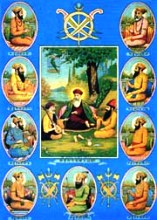| |
|
 |
Sikh origins
 |
 |
 |
The ten Sikh Gurus, with Guru Nanak in the centre |
Beginnings in the Punjab
The word Sikh means student of the Truth. The Sikh faith began in the Punjab in India in the 15th century. Northern India at that time was part of the Muslim Mughal Empire, but the majority of the population was Hindu. It was a time of tension between the two faiths, and also a time of cross-fertilisation.
Guru Nanak, who first taught the Sikh faith, was born a Hindu in 1469 in the part of the Punjab that is now Pakistan. As a young man he gathered a small group of friends who used to pray together to God. One day he gave up his job and started to preach faith in one God, neither Hindu nor Muslim.
Attracted by his songs and simple message, people flocked to Guru Nanak. He rejected the Hindu caste-system and made all his followers equals. He travelled all over India, south as far as Sri Lanka and west as far as Makkah in Arabia. On his travels he established communities of Sikhs, making his headquarters at Kartarpur in the Punjab.
Formation of the Khalsa
Before he died in 1539 Guru Nanak appointed as his successor a devoted follower who became Guru Angad. From 1605 Sikhs were persecuted by the Mughals. This led the tenth and last living Sikh guru, Guru Gobind Singh to form an armed Sikh brotherhood for the defence of their faith, called the Khalsa.
Before he died in 1708 he declared that henceforth the only Guru for all Sikhs should be the collection of hymns and poems now known as the Guru Granth Sahib.
In 1799 Sikhs fighting under Ranjit Singh captured Lahore and established a short-lived independent Sikh state which was annexed by the British in 1849. Subsequently Sikhs rallied to the British and many were recruited into the Sikh Regiment of the British army, and fought all over the world in two world wars.
Their dispersal in part led to the Sikh diaspora. Many former soldiers chose British passports on their retirement and settled in various parts of the British Empire after Indian Independence. Now Sikhs are an international community with approximately 18 million Sikhs in India, and a further million worldwide, mainly in Britain, Canada and the USA.
|
 |
|
|
|
|
|

